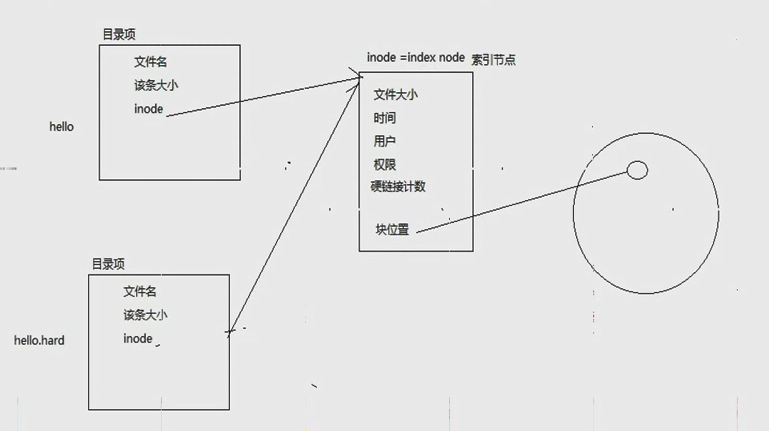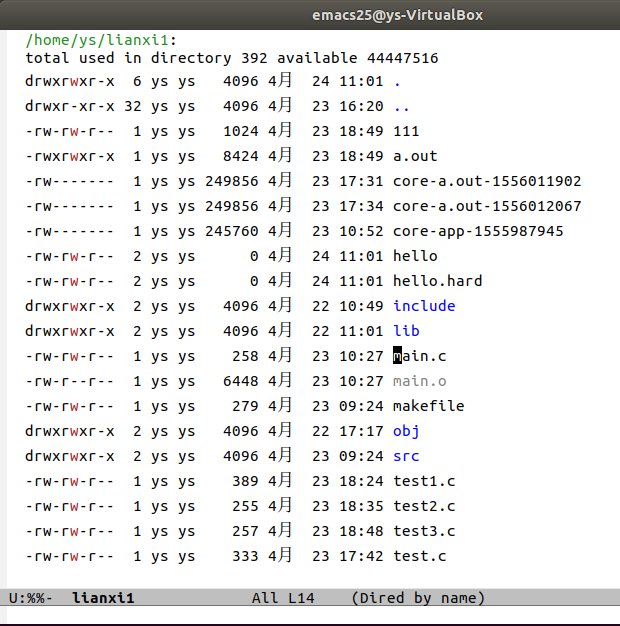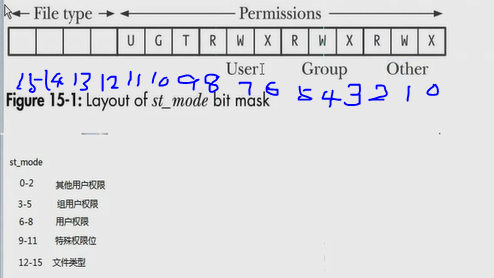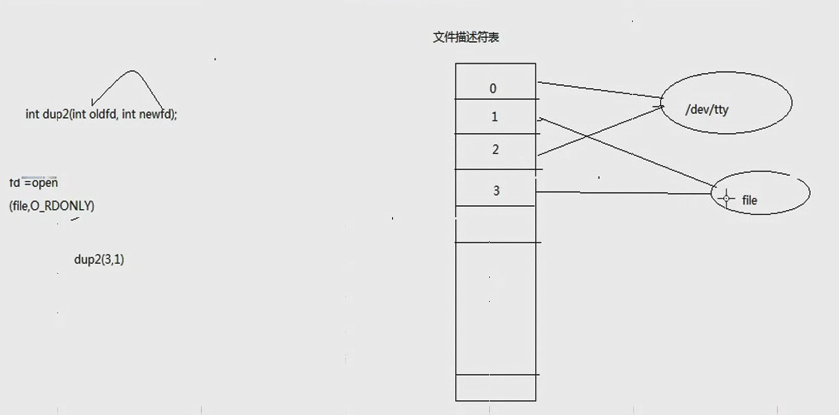stat函数和stat命令
linux文件里的【inode = index node】解释:要理解inode必须了解磁盘和【目录项】,inode实际是连接【目录项】和磁盘的中间物质。
图里的大圈代表硬件的磁盘,里面的小圈代表某个文件存储在磁盘上了。
【inode = index node】的node(承载node信息的结构体是:stat,stat的定义在后面 )里面有:
- 文件大小
- 文件的最后修改时间
- 文件的所属用户
- 文件的权限
- 硬链接计数(ls -l 显示出来的数字)
- 块位置:指定文件存储在磁盘的具体位置。
下图中的hello是个普通文件,hello.hard是hello的硬链接
文件夹里放的就是每个文件的【目录项】如下图,【目录项】里有:
- 文件名
- 该目录项的大小
- 文件的类型
- inode

如何查看文件的【inode】呢?使用【-i】选项
ls -li 文件名执行结果:
ys@ys-VirtualBox:~/lianxi1$ ls -li hello hello.hard 3801352 -rw-rw-r-- 2 ys ys 0 4月 24 11:01 hello 3801352 -rw-rw-r-- 2 ys ys 0 4月 24 11:01 hello.hard发现hello和hello.hard的inode(3801352)是相同的,也就说明了,只在磁盘上存了一份。
如何查看目录项呢?用emacs或者vim打开目录(lianxi1),截图如下。但是看不到文件的【inode】。

1,stat函数:取得指定文件的文件属性,文件属性存储在结构体stat里。
#include <sys/types.h>
#include <sys/stat.h>
#include <unistd.h>
int stat(const char *pathname, struct stat *statbuf);
int fstat(int fd, struct stat *statbuf);
int lstat(const char *pathname, struct stat *statbuf);
struct stat 结构体:
struct stat {
dev_t st_dev; /* ID of device containing file */
ino_t st_ino; /* Inode number */
mode_t st_mode; /* File type and mode */
nlink_t st_nlink; /* Number of hard links */
uid_t st_uid; /* User ID of owner */
gid_t st_gid; /* Group ID of owner */
dev_t st_rdev; /* Device ID (if special file) */
off_t st_size; /* Total size, in bytes */
blksize_t st_blksize; /* Block size for filesystem I/O */
blkcnt_t st_blocks; /* Number of 512B blocks allocated */
/* Since Linux 2.6, the kernel supports nanosecond
precision for the following timestamp fields.
For the details before Linux 2.6, see NOTES. */
struct timespec st_atim; /* Time of last access */
struct timespec st_mtim; /* Time of last modification */
struct timespec st_ctim; /* Time of last status change */
#define st_atime st_atim.tv_sec /* Backward compatibility */
#define st_mtime st_mtim.tv_sec
#define st_ctime st_ctim.tv_sec
};
st_dev:设备ID,不太常用
st_ino:【inode】,【inode】是啥?不知道就看上面关于【inode】的解释
st_mode:文件的类型和权限,共16位,如下图。
0-11位控制文件的权限
12-15位控制文件的类型
0-2比特位:其他用户权限
3-5比特位:组用户权限
6-8比特位:本用户权限
9-11比特位:特殊权限
12-15比特位:文件类型(因为文件类型只有7中,所以用12-14位就够了

文件类型的宏如下(下面的数字是8进制):
S_IFSOCK 0140000 socket
S_IFLNK 0120000 symbolic link(软连接)
S_IFREG 0100000 regular file(普通文件)
S_IFBLK 0060000 block device(块设备文件)
S_IFDIR 0040000 directory(目录)
S_IFCHR 0020000 character device(字符设备文件)
S_IFIFO 0010000 FIFO(管道)
判断文件类型的函数,返回true,false
S_ISREG(stat.st_mode) is it a regular file? S_ISDIR(stat.st_mode) directory? S_ISCHR(stat.st_mode) character device? S_ISBLK(stat.st_mode) block device? S_ISFIFO(m) FIFO (named pipe)? S_ISLNK(stat.st_mode) symbolic link? (Not in POSIX.1-1996.) S_ISSOCK(stat.st_mode) socket? (Not in POSIX.1-1996.)
文件权限的宏如下:
S_ISUID 04000 set-user-ID bit
S_ISGID 02000 set-group-ID bit (see below)
S_ISVTX 01000 sticky bit (see below)
S_IRWXU 00700 owner has read, write, and execute permission
S_IRUSR 00400 owner has read permission
S_IWUSR 00200 owner has write permission
S_IXUSR 00100 owner has execute permission
S_IRWXG 00070 group has read, write, and execute permission
S_IRGRP 00040 group has read permission
S_IWGRP 00020 group has write permission
S_IXGRP 00010 group has execute permission
S_IRWXO 00007 others (not in group) have read, write, and
execute permission
S_IROTH 00004 others have read permission
S_IWOTH 00002 others have write permission
S_IXOTH 00001 others have execute permission
st_nlink:硬连接计数
st_uid:这个文件所属用户的ID
st_gid:这个文件所属用户的组ID
st_rdev:特殊设备的ID,不太常用
st_size:文件的大小
st_blksize:不明是干啥的
st_blocks:不明是干啥的
struct timespec st_atim:最后访问的时间
struct timespec st_mtim:最后修改的时间
struct timespec st_ctim:最后状态改变的时间
struct timespec { __kernel_time_t tv_sec; /* seconds */当前时间到1970.1.1 00:00:00的秒数 long tv_nsec; /* nanoseconds *//纳秒数(不知道从哪到哪的) }; 1s 秒 = 1000ms 毫秒 1ms 毫秒 = 1000us 微秒 1us 微秒 = 1000ns 纳秒
pathname:文件名
返回值:0代表成功;-1代表失败,并设置error
例子:statbuf是结构体stat,可以看出来st_mode是个10进制的数字。

st_mode
用gdb显示st_mode,发现返回的st_mode是个10进制的数字,用gdb的【p/o】(o代表用8进制表示)命令把10进制的33204转换成了8进制的【0100664】,第一个0代笔是8进制,后三位的【100】代表文件类型,从上面的说明可以看出来【100】代表普通文件,最后三位的【664】代表这个文件的权限(本用户:rw-,组用户:rw-,其他用户:r--)。所以从st_mode里就可以得知文件的类型和权限设置(只使用了16个比特位,真的好节省空间,牛逼!)
st_uid
st_gid
发现st_uid和st_gid是1000,但这个1000怎么和用户对应上呢,查看/etc/passwd文件,发现用于ys的uid和gid都是1000,所以就对应上了。

stat命令,是stat函数对应,执行结果如下:
ys@ys-VirtualBox:~/lianxi1$ stat hello
File: hello
Size: 11 Blocks: 8 IO Block: 4096 regular file
Device: 801h/2049d Inode: 3801352 Links: 2
Access: (0764/-rwxrw-r--) Uid: ( 1000/ ys) Gid: ( 1000/ ys)
Access: 2019-04-24 17:02:39.199461489 +0800
Modify: 2019-04-24 16:54:16.407461489 +0800
Change: 2019-04-24 17:03:44.927461489 +0800
2,getpwuid函数:返回/etc/passwd文件里指定uid的行,把这一行的信息放入结构体passwd中。虽然返回值是指针,但不需要调用free函数。
#include <sys/types.h>
#include <pwd.h>
struct passwd *getpwnam(const char *name);
struct passwd *getpwuid(uid_t uid);
struct passwd {
char *pw_name; /* username */
char *pw_passwd; /* user password */
uid_t pw_uid; /* user ID */
gid_t pw_gid; /* group ID */
char *pw_gecos; /* user information */
char *pw_dir; /* home directory */
char *pw_shell; /* shell program */
};
3,getgrgid函数:返回/etc/group文件里指定gid的行,把这一行的信息放入结构体group中。虽然返回值是指针,但不需要调用free函数。
#include <sys/types.h>
#include <grp.h>
struct group *getgrnam(const char *name);
struct group *getgrgid(gid_t gid);
struct group {
char *gr_name; /* group name */
char *gr_passwd; /* group password */
gid_t gr_gid; /* group ID */
char **gr_mem; /* NULL-terminated array of pointers
to names of group members */
};
4,localtime函数:传入从stat函数里得到的st_mtim.tv_sec(当前时间到1970.1.1 00:00:00的秒数),得到结构体tm。虽然返回值是指针,但不需要调用free函数。
#include <time.h>
struct tm *localtime(const time_t *timep);
struct tm {
int tm_sec; /* Seconds (0-60) */
int tm_min; /* Minutes (0-59) */
int tm_hour; /* Hours (0-23) */
int tm_mday; /* Day of the month (1-31) */
int tm_mon; /* Month (0-11) */
int tm_year; /* Year - 1900 */
int tm_wday; /* Day of the week (0-6, Sunday = 0) */
int tm_yday; /* Day in the year (0-365, 1 Jan = 0) */
int tm_isdst; /* Daylight saving time */
};
5,lstat函数:stat碰到软链接,会追述到源文件,穿透;lstat并不会穿透。
例子:模仿ls -l 文件
#include <sys/types.h>
#include <sys/stat.h>
#include <unistd.h>
#include <stdio.h>
#include <string.h>
#include <pwd.h>//getpwuid
#include <stdlib.h>
#include <time.h>//localtime
#include <grp.h>//getgrgid
int main(int argc, char* argv[]){
struct stat sbuf;
//stat(argv[1], &sbuf);
lstat(argv[1], &sbuf);
char str[11] = {0};
memset(str, '-', (sizeof str - 1));
//文件类型
if(S_ISREG(sbuf.st_mode)) str[0] = '-';
if(S_ISDIR(sbuf.st_mode)) str[0] = 'd';
if(S_ISCHR(sbuf.st_mode)) str[0] = 'c';
if(S_ISBLK(sbuf.st_mode)) str[0] = 'b';
if(S_ISFIFO(sbuf.st_mode)) str[0] = 'p';
if(S_ISLNK(sbuf.st_mode)) str[0] = 'l';
if(S_ISSOCK(sbuf.st_mode)) str[0] = 's';
//本用户的文件权限
if(sbuf.st_mode & S_IRUSR) str[1] = 'r';
if(sbuf.st_mode & S_IWUSR) str[2] = 'w';
if(sbuf.st_mode & S_IXUSR) str[3] = 'x';
//本用户的组的文件权限
if(sbuf.st_mode & S_IRGRP) str[4] = 'r';
if(sbuf.st_mode & S_IWGRP) str[5] = 'w';
if(sbuf.st_mode & S_IXGRP) str[6] = 'x';
//其他用户的文件权限
if(sbuf.st_mode & S_IROTH) str[7] = 'r';
if(sbuf.st_mode & S_IWOTH) str[8] = 'w';
if(sbuf.st_mode & S_IXOTH) str[9] = 'x';
char ymd[20] = {0};
//取得日期和时间
struct tm* tm = localtime(&sbuf.st_atim.tv_sec);
sprintf(ymd, "%2d月 %2d %02d:%02d", tm->tm_mon + 1, tm->tm_mday,
tm->tm_hour + 1,tm->tm_sec);
//-rw-r--r-- 1 ys ys 134 4月 25 09:21 st2.c
printf("%s %ld %s %s %ld %s %s\n", str, sbuf.st_nlink,
getpwuid(sbuf.st_uid)->pw_name, getgrgid(sbuf.st_gid)->gr_name,
sbuf.st_size, ymd, argv[1]);
return 0;
}
6,access函数:判断调用程序的用户对于指定文件的权限(可读?可写?可执行?)
#include <unistd.h>
int access(const char *pathname, int mode);
- pathname:文件
- mode
- R_OK:可读?
- W_OK:可写?
- X_OK:可执行?
- F_OK:文件存在?
- 返回值
- 查询的权限存在或者文件存在:返回0。
- 查询的权限不存在或者文件不存在:返回-1。
例子:
#include <stdio.h>
#include <unistd.h>//access
int main(int argc, char* argv[]){
if(access(argv[1], R_OK) == 0)
printf("read ok\n");
if(access(argv[1], W_OK) == 0)
printf("write ok\n");
if(access(argv[1], X_OK) == 0)
printf("exe ok\n");
if(access(argv[1], F_OK) == 0)
printf("exists\n");
}
先用ls -l 查看/usr/include/time.h文件的权限,结果如下
ys@ys-VirtualBox:~/lianxi$ ls -l /usr/include/time.h -rw-r--r-- 1 root root 10360 4月 17 2018 /usr/include/time.h用ys用户执行例子程序,查看/usr/include/time.h文件,结果如下。因为time.h是属于root用户的,对于其他用户来说是[r--],所以得出下面的结果。
ys@ys-VirtualBox:~/lianxi$ ./ac /usr/include/time.h read ok exists还是用ys用户执行,但是加上sudo,结果如下。发现结果和root用户相同。因为加了sudo,就编程了root用户。
ys@ys-VirtualBox:~/lianxi$ sudo ./ac /usr/include/time.h [sudo] password for ys: read ok write ok exists
7,truncate函数:截断文件和扩展文件的大小
#include <unistd.h>
#include <sys/types.h>
int truncate(const char *path, off_t length);
- path:文件
- length:
- length大于原来文件的大小,则扩展文件的大小至length
- length小于原来文件的大小,则截断文件的大小至length
8,link函数:创建硬链接
#include <unistd.h>
int link(const char *oldpath, const char *newpath);
返回值:成功返回0,失败返回-1,并设置errno。
9,symlink函数:创建软链接
#include <unistd.h>
int symlink(const char *target, const char *linkpath);
返回值:成功返回0,失败返回-1,并设置errno。
10,readlink函数:找到软链接对应的实际文件,把文件的名字放入buf里。注意:硬链接不行。
#include <unistd.h>
ssize_t readlink(const char *pathname, char *buf, size_t bufsiz);
返回值:成功返回写入buf的字节数,失败返回-1,并设置errno。
11,unlink函数:删除软硬链接,也可以删除文件。
#include <unistd.h>
int unlink(const char *pathname);
返回值:成功返回0,失败返回-1,并设置errno。
有个特殊用法:下面的open代码想要创建hello文件,然后直接用unlink删除,但是能写入成功,ret是大于0的,程序执行完,发现没有做成hello文件。
结论:当执行unlink后,计数为0后,但,发现别的进程还引用这个文件,这个时间点,unlink不会删除这个文件,等这个进程结束后,再删除,所以下面的write代码能够写入成功。 利用这个特点可以实现:在线观看视频时,实际是把视频文件下载到了本地(然后代码里,使用unlink),看完后视频文件的计数为0,就自动删除了,不怕视频被泄露出去。
#include <unistd.h>
#include <sys/types.h>
#include <stdio.h>
#include <sys/stat.h>
#include <fcntl.h>
int main(){
int fd = open("hello", O_WRONLY | O_CREAT, 0666);
unlink("hello");
int ret = write(fd, "aaa", 4);
if(ret > 0){
printf("write OK\n");
}
}
12,chown函数:改变文件的所属用户和组
#include <unistd.h>
int chown(const char *pathname, uid_t owner, gid_t group);
- pathname:文件
- owner:用户ID(数字的)/etc/passwd
- group:组ID(数字的)/etc/group
- 返回值:0成功,-1失败。
13,rename函数:重命名
#include <stdio.h>
int rename(const char *oldpath, const char *newpath);
- oldpath :原来的文件名后者目录
- newpath:新的文件名后者目录
- 返回值:0成功,-1失败。
14,getcwd函数:获得当前工作的目录
#include <unistd.h>
char *getcwd(char *buf, size_t size);
- buf:当前工作的目录
- size:缓冲区大小
- 返回值:
- 成功返回当前工作的目录
- 失败返回NULL
15,chdir函数:改变进程的工作目录
#include <unistd.h>
int chdir(const char *path);
- path:目标工作目录
- 返回值:0成功,-1失败
16,mkdir函数:创建目录
#include <sys/stat.h>
#include <sys/types.h>
int mkdir(const char *pathname, mode_t mode);
- pathname:目标工作目录
- mode:mode & ~umask & 0777 。注意,如果没有x权限,则无法cd进入这个目录。
- 返回值:0成功,-1失败
17,rmdir函数:删除目录,目录必须是空目录,也就是里面没有任何文件。
#include <unistd.h>
int rmdir(const char *pathname);
18,opendir函数:打开目录
#include <sys/types.h>
#include <dirent.h>
DIR *opendir(const char *name);
- name:目录名
- 返回值:a pointer to the directory stream
19,readdir函数:读目录
#include <dirent.h>
struct dirent *readdir(DIR *dirp);
struct dirent {
ino_t d_ino; /* Inode number */
off_t d_off; /* Not an offset; see below */
unsigned short d_reclen; /* Length of this record */
unsigned char d_type; /* Type of file; not supported
by all filesystem types */
char d_name[256]; /* Null-terminated filename */
};
- dirp:opendir函数的返回值
- 返回值:结构体dirent,可以理解成最上面说的【目录项】
- NULL代表读到末尾或者有错误
- NULL以外代表目录项的内容
20,closedir函数:关闭目录
#include <sys/types.h>
#include <dirent.h>
int closedir(DIR *dirp);
- dirp:opendir函数的返回值
21,strerron函数:打印出errno对应的文字信息。
#include <string.h>
char *strerror(int errnum);
- errnum的宏放在文件:/usr/include/asm-generic/errno.h
例子:
#include <string.h>
#include <stdio.h>
#include <asm-generic/errno.h>//EDEADLK
int main(){
char* buf = strerror(EDEADLK);
printf("%s\n", buf);//Resource deadlock avoided
}
22,dup和dup2函数:文件描述符的重定向
#include <unistd.h>
int dup(int oldfd);
int dup2(int oldfd, int newfd);
- dup:和open类似,先打开一个新的文件描述符,让新的文件描述符也指向:oldfd指向的地方。
- 成功返回新打开的文件描述符;失败返回-1.
- dup2:
- 先消除newfd的指向
- 再让newfd指向oldfd指向的地方
- 成功返回newfd;失败返回-1.

例子:调用printf2次,第一次printf把内容写到文件;第二次printf把内容打印到屏幕。
#include <stdio.h>
#include <unistd.h>
#include <sys/types.h>
#include <sys/stat.h>
#include <fcntl.h>
int main(){
int oldfd = dup(STDOUT_FILENO);
int fd = open("www", O_WRONLY | O_CREAT, 0666);
dup2(fd, STDOUT_FILENO);
printf("aaaa\n");
fflush(stdout);
int ret = dup2(oldfd, STDOUT_FILENO);
//int ret = dup2(oldfd, 6);
//perror("dup2:");
printf("reg:%d\n", ret);
printf("aaaa\n");
close(fd);
}
c/c++ 学习互助QQ群:877684253














